| | | | | | | Presented By BigSpring | | | | Axios What's Next | | By Jennifer A. Kingson and Joann Muller · May 12, 2022 | | Could technology could help solve the "food desert" problem? Researchers from the Brookings Institution think so, as Joann Muller writes. - Oops! We all make mistakes, and yesterday we made a doozy in our story about the Ford F-150 Lightning electric truck: Ford takes in $40 billion in annual revenue from its F-series trucks, not $40 million. Thanks to the many sharp-eyed readers who got in touch.
- Today's reader photo comes from Karen Raffensperger, who took it at the University of Arizona.
- Got a picture to share? Email whatsnext@axios.com.
Today's Smart Brevity count: 1,166 words ... 4½ minutes. | | | | | | 1 big thing: Food delivery needs tech support in some neighborhoods | 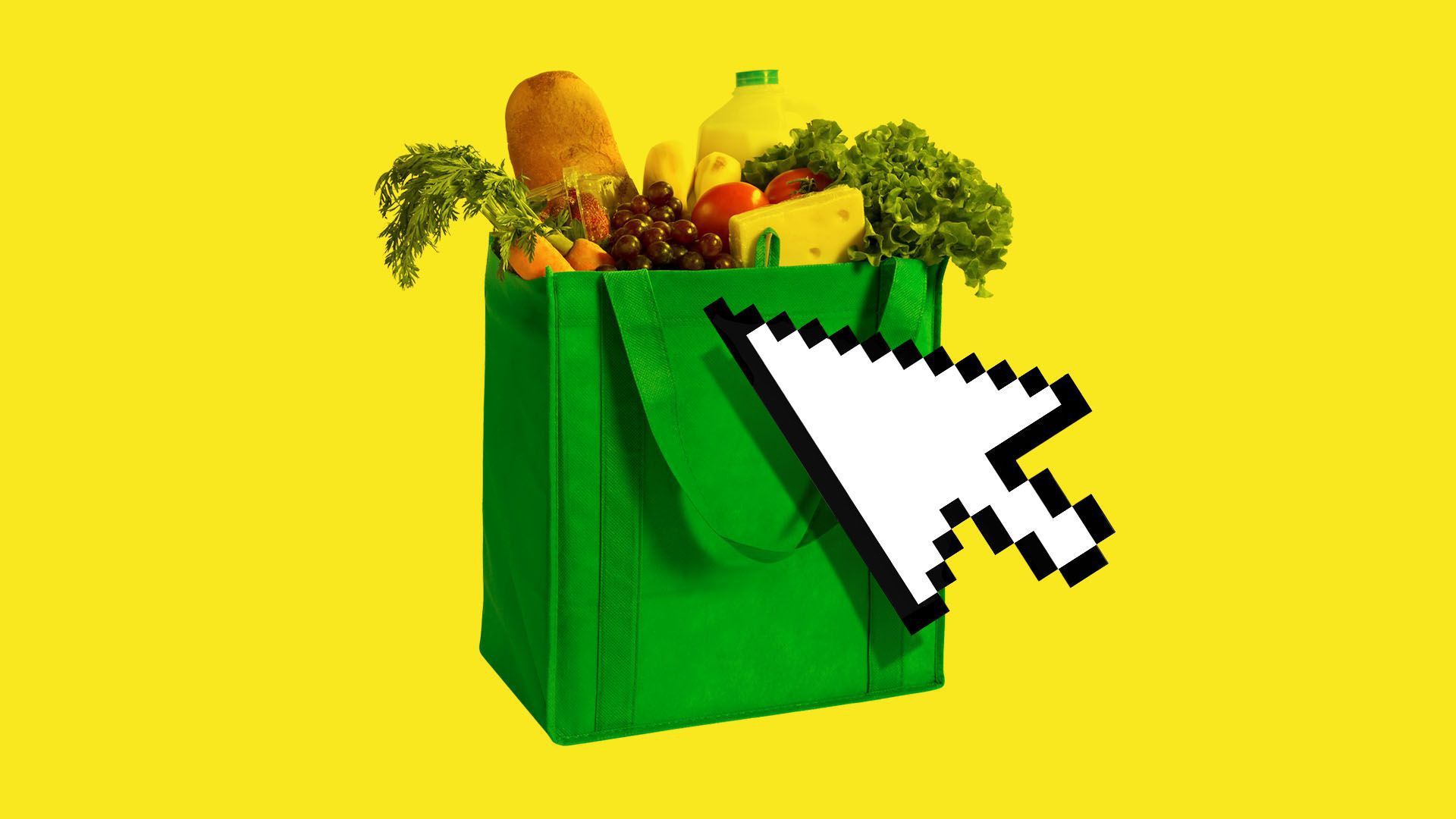 | | | Illustration: Sarah Grillo/Axios Visuals | | | | Internet-based food delivery services have the potential to transform the lives of people who live in "food deserts" — but only if broadband becomes more widely available there, according to a new Brookings Institution report. Why it matters: Access to healthy food is closely tied to economic security and public health. And while lots of low-income neighborhoods don't have great local supermarkets, they do have access to the four most prominent food delivery platforms: AmazonFresh/Whole Foods, Instacart, Uber Eats and Walmart. What's happening: Brookings found that 93% of Americans have access to "rapidly-delivered fresh groceries or prepared foods" through at least one of the four providers, including 90% of food desert residents. - But the services — which could be life-changing — tend to be costly.
- And without reliable broadband service and the skills and devices to order food online, many people are unable to use them.
"Delivery services are not a panacea," Adie Tomer, a senior fellow at Brookings Metro, tells Axios. - Rather, the potential for these services to improve the lives of low-income people should "push policymakers to modernize their approach to a whole range of related issues, from the price of delivery services and broadband to measuring how well small businesses can compete on digital platforms."
Details: The mismatch between access to food delivery and broadband coverage is most acute in certain urban areas. - In one Chicago neighborhood where delivery is readily available, only 30.2% of households have broadband subscriptions, Brookings found.
- In all, 863,000 Chicagoans could have better access to food if they had mobile or broadband service, the researchers said.
- In Detroit, food insecurity could be addressed for nearly 600,000 people with better broadband service; in Atlanta, it's more than 1 million.
Keep reading. |     | | | | | | 2. Want to rent a castle? Airbnb has an upgrade for that | 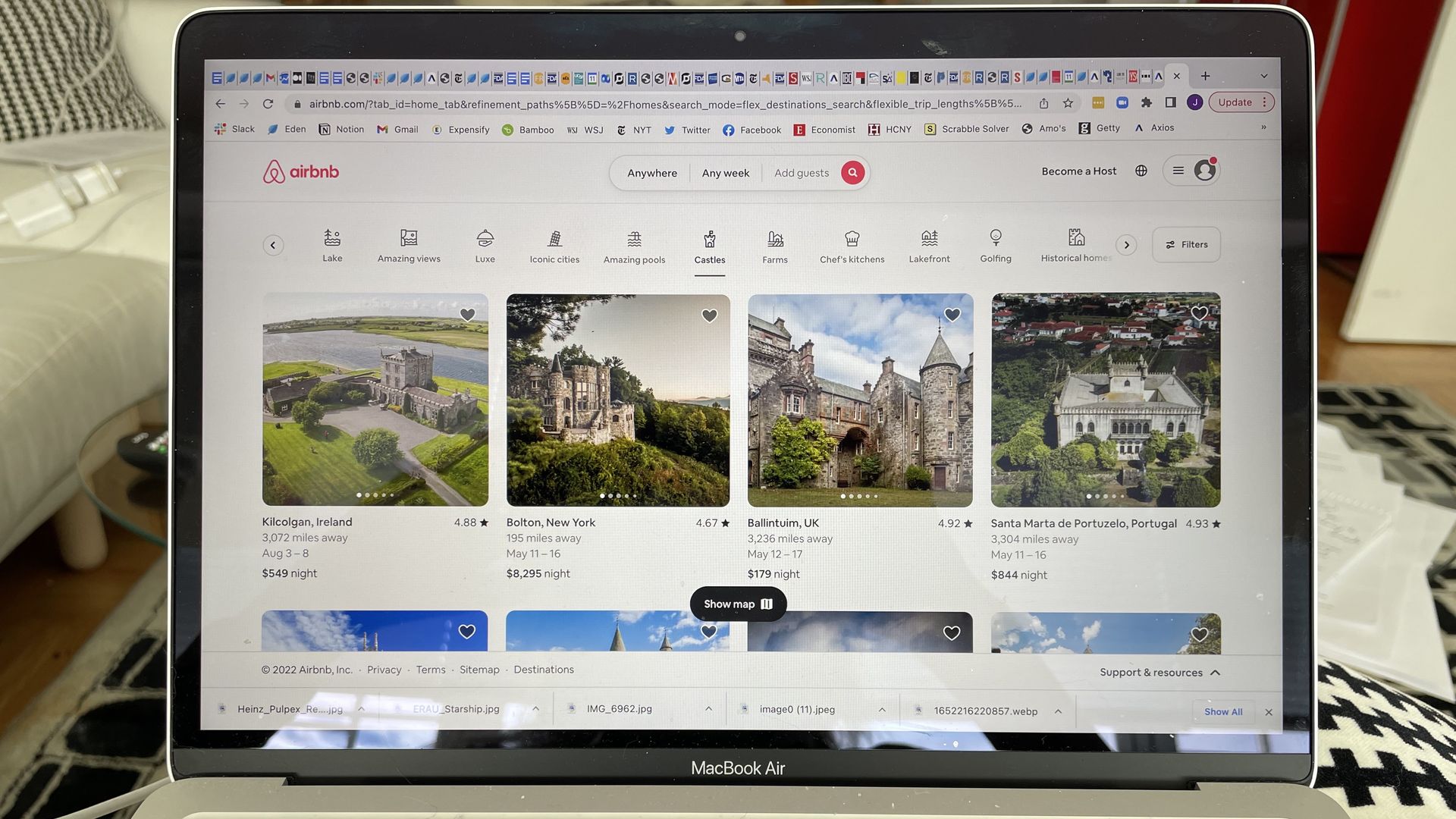 | | | Airbnb's new interface makes it easy to find the castle of your dreams. Photo: Jennifer A. Kingson | | | | In what CEO Brian Chesky calls "the biggest change to Airbnb in a decade," the home rental company introduced a sitewide makeover Wednesday that makes it easier to find offbeat and niche properties, Jennifer A. Kingson writes. Why it matters: As travel companies gear up for the summer rush — which will be intensified this year by pent-up post-COVID demand — Airbnb is trying to differentiate itself and give consumers fresh options. Driving the news: The upgrades Airbnb released Wednesday are designed to get people to expand their travel horizons beyond choosing a destination city and travel dates: - A new set of 56 "categories" of lodging — from castles and tiny homes to domes, treehouses and lakefront properties — allows people to browse and fantasy shop for places they didn't know they could visit.
- A new "split stay" feature will suggest you divide your time between two nearby Airbnb properties if you're planning to be away for a week or more.
- New "AirCover" protections offer more generous guarantees, safeguarding you if a host cancels, a property isn't as advertised, or you feel unsafe.
Between the lines: Chesky says he wants to prevent "overtourism," or too many people all trying to visit the same places (like Paris, London and Disney World). Details: Each "category" tells you approximately how many properties are listed in it, no matter where they are geographically or when they're available. - The "amazing pools" category has more than a million listings, for instance, while "caves" has 600, "mansions" has 1,000 and "national parks" has 600,000.
- "We don't just have castles — we have a lot of them," said Chesky, noting that the 3,000 properties in the "castles" category are available at all different price points.
What's next: "We're going to keep adding a lot of categories," Chesky said. "This is just the beginning." Share this story. |     | | | | | | 3. Familiar ketchup in new (paper) bottles | 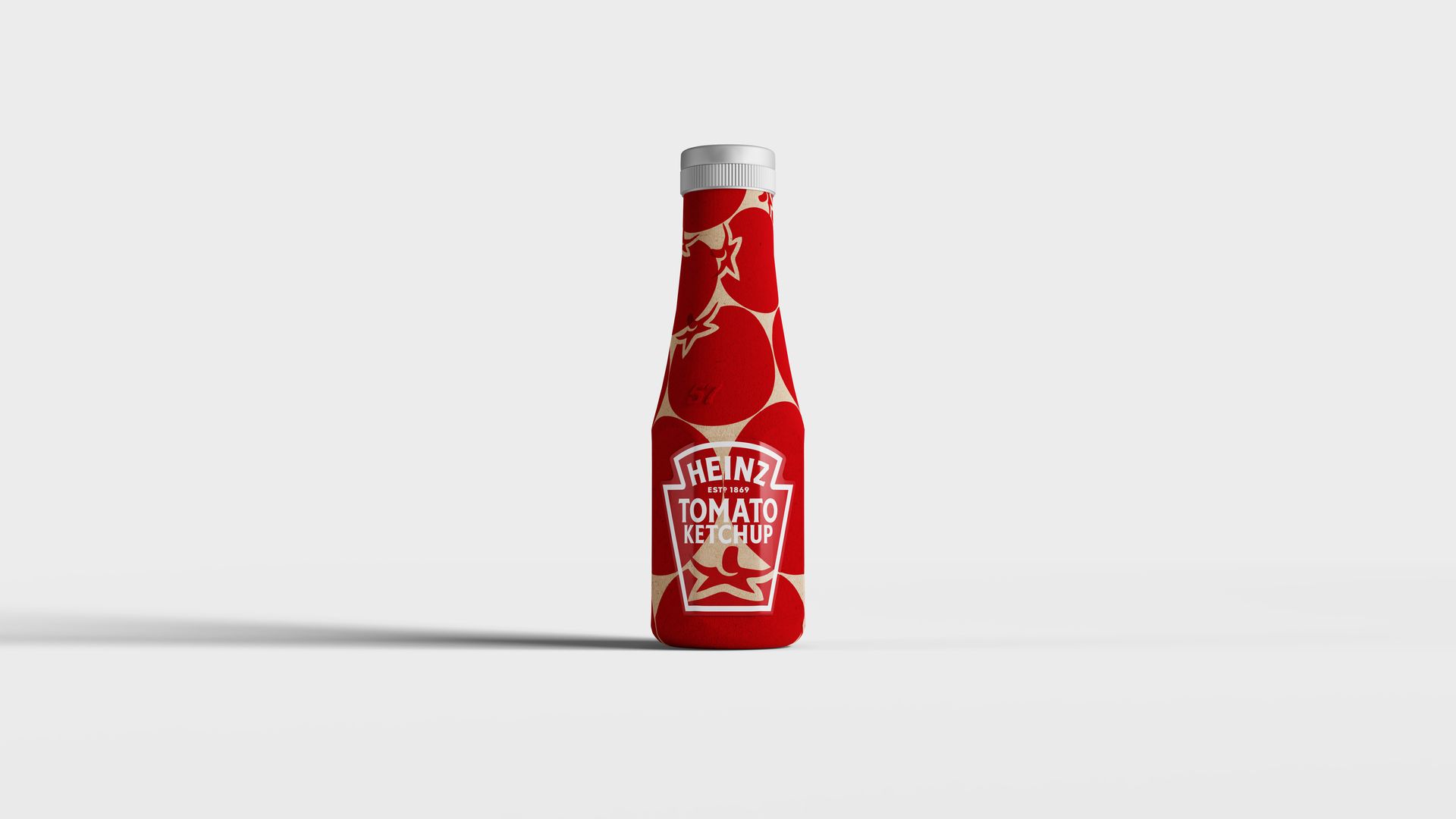 | | | What the new paper ketchup bottle might look like. Image courtesy of Kraft Heinz | | | | Heinz says it's developing a paper-based version of its iconic ketchup bottle, Jennifer writes. Why it matters: Consumer product companies are busy trying to reduce packaging-related waste and pollution — because so much of it winds up in the earth's oceans and landfills, and consumers are very concerned about the problem. Driving the news: The Kraft Heinz Company is working with Pulpex, a sustainable packaging technology company, to craft a recyclable bottle made from "100% sustainably sourced wood pulp." - Current Heinz Tomato Ketchup containers are made from glass and plastic.
- The company wants "to make all packaging globally recyclable, reusable or compostable by 2025."
- Heinz says its next step will be to assess the performance of paper-bottle prototypes before bringing the bottle to market. (It didn't give a timeline.)
What they're saying: Heinz aims to be "the first sauce brand to provide consumers this choice in their purchasing decisions," said Rashida La Lande, Kraft Heinz's chief sustainability and corporate affairs officer. Share this story. |     | | | | | | A message from BigSpring | | Standardize global onboarding | | |  | | | | Onboarding business development representatives (BDRs) who are located globally and may be working from home provides challenges to standardization. Okay, but: A leading cloud platform uses BigSpring to deploy demonstration-based onboarding that teaches globally relevant skills. Learn how. | | | | | | 4. New Barbie line is the latest example of more diverse toys | 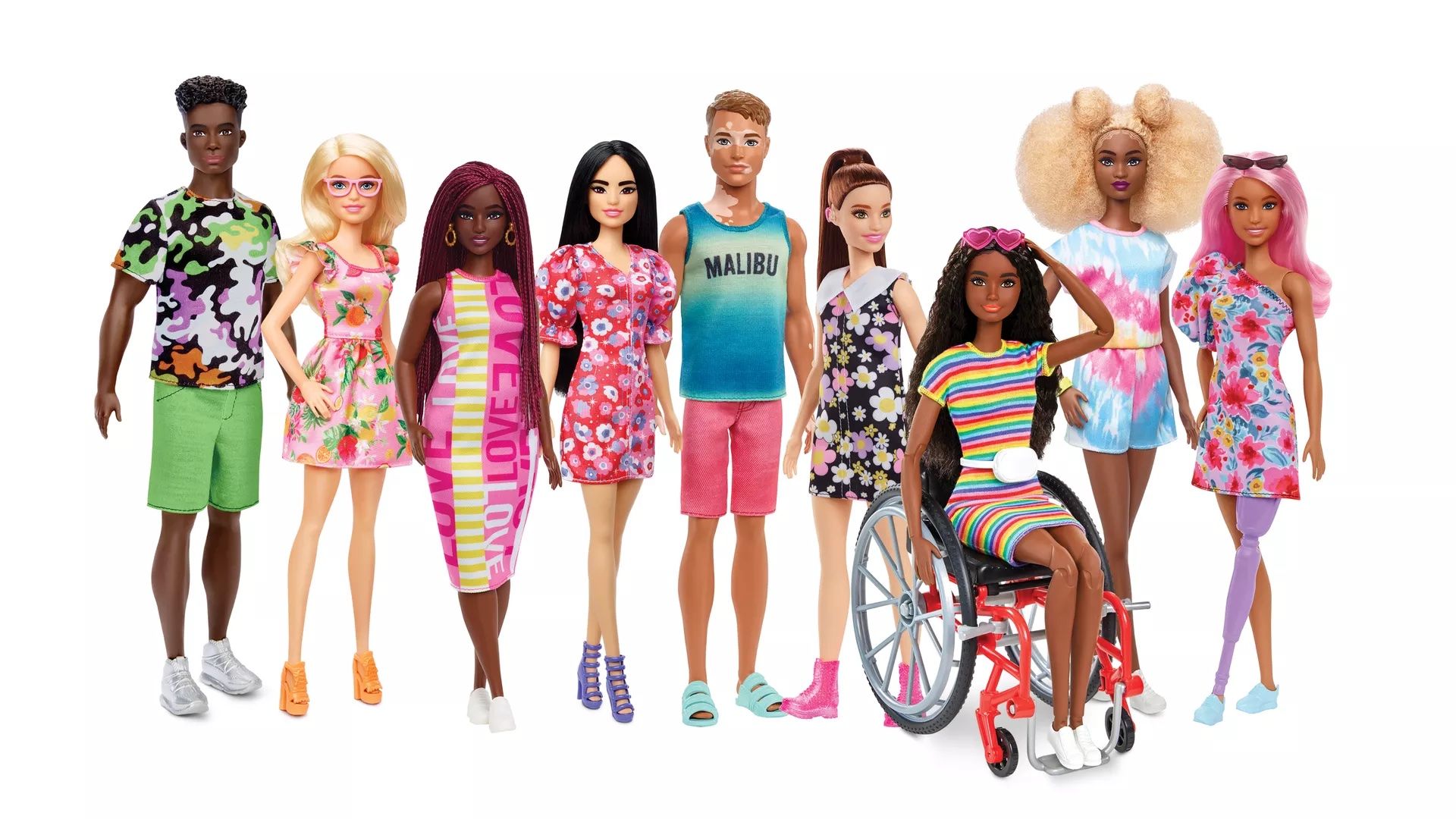 | | | Barbie Fashionistas. Photo: Mattel | | | | Mattel announced a set of new Barbie dolls Wednesday that aims to represent more children from various backgrounds and communities, including one doll with a behind-the-ear hearing aid, Axios' Herb Scribner writes. Why it matters: Legacy toy brands have been busy releasing more diverse and inclusive dolls in recent years, giving children more options for toys that represent them and their backgrounds. Driving the news: The new lineup, which will debut in June, includes a Barbie with a prosthetic leg and a Ken doll with vitiligo, a condition where the skin loses its pigment cells. - Mattel tells Axios it has released more than 175 looks in the Fashionistas line, including dolls with "a variety of skin tones, eye colors, hair colors and textures, body types, disabilities, and fashions."
Zoom out: Mattel's Barbie brand first announced the Fashionistas doll set back in January 2020 with eight body types, 35 skin tones and 94 hairstyles, which were "designed to reflect the world girls see today," CBS News reported. - It later added a Barbie wearing a hijab — based on Olympic fencer Ibtihaj Muhammad, the first American Olympic athlete to wear a hijab while competing — back in 2016, per CNN.
- In 2019, Mattel released the Creatable World line, which included the world's first gender-neutral dolls. The dolls came with multiple wardrobe options, accessories and wigs, allowing children to create any character they wanted.
Read the rest. |     | | | | | | 5. Reader photo: Delivery robots on campus | 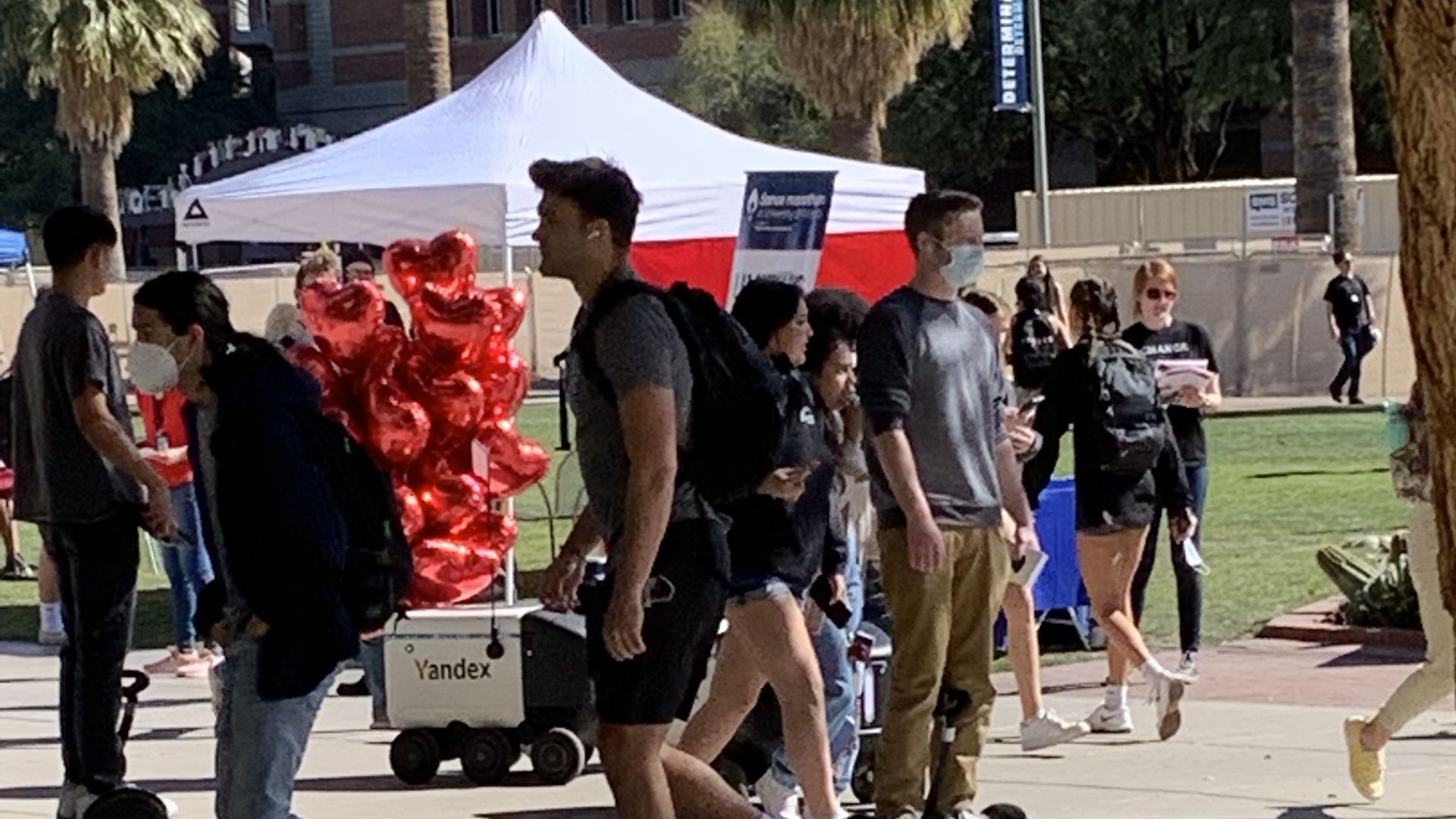 | | | A delivery robot at the University of Arizona. Photo by Karen Raffensperger | | | | What's Next reader Karen Raffensperger writes: "University of Arizona had these all over campus — in this case, delivering flowers for Valentine's Day." - "However, Grubhub has since stopped using the robot delivery systems because the machines were supplied by a Russian company."
The big picture: Though they're far from ubiquitous yet, robots are becoming popular fixtures on college campuses across the U.S., delivering meals and sundries. - While a company called Starship Technologies seems to be out in front in deploying robots at schools, it isn't the only autonomous delivery company to see this market as a good one.
Where it stands: Last year, Grubhub and the Russian tech company Yandex introduced fleets of delivery robots at Ohio State University and the University of Arizona, only to end the services after Russia invaded Ukraine. - In response to a query from Axios, Yulia Shveyko, head of media relations for Yandex Self-Driving Cars, said: "Yes, our partnership with Grubhub has ended. The U.S. operations are currently paused, and robots are being transferred to other locations."
|     | | | | | | A message from BigSprings | | Critical onboarding solutions | | |  | | | | A leading cloud platform standardizes the onboarding of business development representatives (BDRs) using BigSpring. Why it's important: BDRs are globally distributed, which can slow growth when coupled with other challenges. BigSpring offers onboarding solutions on a single platform. | | | | Was this email forwarded to you? Get your daily dose of What's Next magic by signing up for our free newsletter here. |  | It's called Smart Brevity®. Over 200 orgs use it — in a tool called Axios HQ — to drive productivity with clearer workplace communications. | | | | | | Axios thanks our partners for supporting our newsletters. If you're interested in advertising, learn more here.
Sponsorship has no influence on editorial content. Axios, 3100 Clarendon Blvd, Suite 1300, Arlington VA 22201 | | | You received this email because you signed up for newsletters from Axios.
Change your preferences or unsubscribe here. | | | Was this email forwarded to you?
Sign up now to get Axios in your inbox. | | | | Follow Axios on social media:    | | | | | |










No comments:
Post a Comment